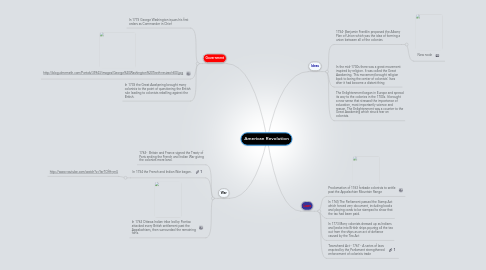American Revolution
von Michael Munro


1. Government
1.1. In 1775 George Washington issues his first orders as Commander in Chief
1.2. http://blog.drnemeth.com/Portals/35943/images/George%20Washington%20Teeth-resized-600.jpg
1.3. In 1735 the Great Awakening brought many colonists to the point of questioning the British rule leading to colonists rebelling against the British.
2. War
2.1. 1763- Britain and France signed the Treaty of Paris ending the French and Indian War giving the colonies more land.
2.2. In 1754 the French and Indian War began.
2.2.1. http://www.youtube.com/watch?v=Yer7OfHyynU
2.3. In 1763 Ottawa Indian tribe led by Pontiac attacked every British settlement past the Appalachians, then surrounded the remaining forts.
3. Laws
3.1. Proclamation of 1763 forbade colonists to settle past the Appalachian Mountain Range
3.2. In 1765 The Parliament passed the Stamp Act which forced very document, including books and playing cards to be stamped to show that the tax had been paid.
3.3. In 1773 Many colonists dressed up as Indians and broke into British ships pouring all the tea out from the ships as an act of defiance caused by the Tea Act
3.4. Townshend Act - 1767 - A series of laws enacted by the Parliament strengthened enforcement of colonists trade
4. Ideas
4.1. 1754- Benjamin Franklin proposed the Albany Plan of Union which was the idea of forming a union between all of the colonies
4.1.1. New node
